The dream of “Made in Vietnam” high-quality trucks, bearing Vietnamese brands, has long been cherished within the domestic automotive industry. Going beyond mere assembly, the greater aspiration is to build a robust Vietnamese truck manufacturing industry with a high localization rate, meeting domestic market needs and competing in the international market. However, realizing this dream remains challenging and requires continuous effort from Vietnamese truck manufacturers.
Vietnam’s automotive industry, including the truck sector, began to take shape and develop over the past two decades. Compared to other countries in the region, Vietnam started later and faces significant competitive pressures. The initial steps were taken in 1991, while other nations already possessed well-established automotive industries. How to compete, develop, and expand globally are questions that Vietnamese truck manufacturers have been grappling with throughout their journey.
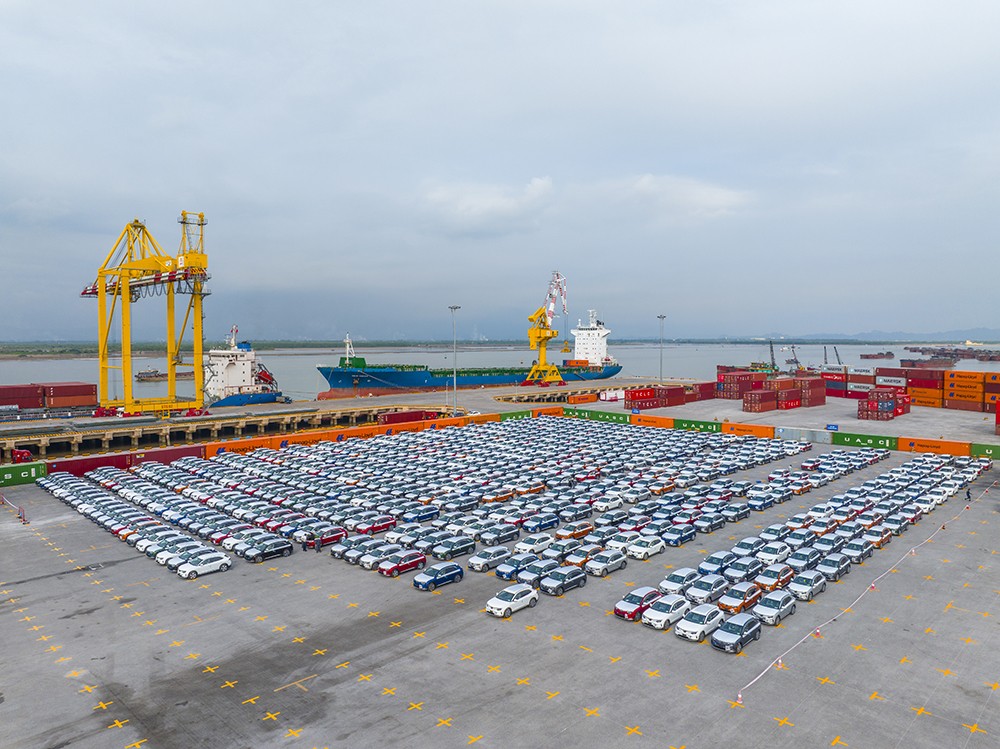 VinFast VF e34 electric truck at the factory, showcasing Vietnamese companies' efforts in modern truck production.
VinFast VF e34 electric truck at the factory, showcasing Vietnamese companies' efforts in modern truck production.
In 2017, Decree 116 of the Government clearly stated that the automotive industry, including trucks, is a crucial driving force for the country’s industrialization and modernization, and should be encouraged to develop through stable, consistent, and long-term policies. This decree also emphasized promoting the potential of businesses across all economic sectors, ensuring fair competition between domestic production and imports, protecting consumer rights and the environment, and complying with Vietnam’s international commitments.
Despite supportive policies and guidelines, the Vietnamese automotive industry in general, and the Vietnamese truck manufacturing sector in particular, experienced slow development and lacked significant breakthroughs. However, in recent years, there have been noteworthy positive signs.
According to data from the Vietnam Register, the output of domestically produced and assembled vehicles, including trucks, grew during the period 2018-2020. Specifically, production reached 287,586 vehicles in 2018, increased to 339,151 vehicles in 2019, and reached 323,892 vehicles in 2020. These figures demonstrate the efforts of Vietnamese truck manufacturers to increase production and meet market demand.
Domestic manufacturing and assembly enterprises, including truck manufacturers, have begun to establish their role and position in the Vietnamese automotive market. As of the end of 2020, the Vietnamese automotive industry had over 40 enterprises engaged in the production and assembly of various types of vehicles, including cars, trucks, buses, specialized vehicles, and chassis. Among them, several domestic enterprises have actively participated in the global automotive production chain. Total designed assembly capacity reached approximately 755,000 vehicles per year, with foreign-invested enterprises accounting for about 35% and domestic enterprises accounting for about 65%.
In the truck segment, Vietnamese truck manufacturers have focused on light trucks under 7 tons, buses with 25 seats or more, and specialized vehicles. These vehicle types have achieved a relatively high localization rate, around 50% for light trucks and over 60% for buses, basically meeting domestic market demand. Some bus and car products manufactured and assembled by Thaco have been exported to Thailand, the Philippines, and other markets. Domestic vehicle manufacturers and assemblers have made significant contributions to the state budget and created jobs for hundreds of thousands of workers.
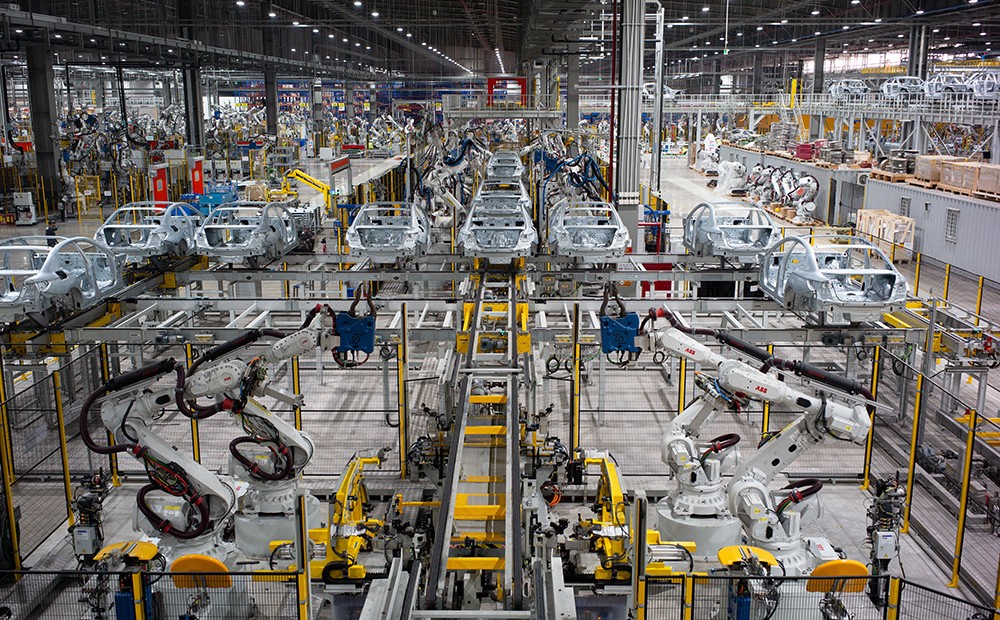 Modern truck production line at Thaco factory, illustrating the manufacturing capabilities of Vietnamese enterprises.
Modern truck production line at Thaco factory, illustrating the manufacturing capabilities of Vietnamese enterprises.
However, compared to the development of the global and regional automotive industry, Vietnam’s automotive industry in general, and the supporting industries for the automotive industry in particular, still face many limitations. Development is fragmented and dispersed, and the linkages between assemblers and suppliers are weak. The role of business associations related to supporting industries is limited. These objective and subjective factors have affected the development of Vietnam’s automotive industry, which has not met expectations.
Recently, in light of global changes and the realities of Vietnam’s automotive industry, the Ministry of Science and Technology issued Circular 11/2022/TT-BKHCN, abolishing legal documents regulating the method of determining the localization rate for automobiles. According to experts, abolishing these regulations is appropriate and necessary for the development and changes in the technology and process of automobile production and assembly today, aiming to ensure transparency and rationality.
The abolition of these regulations not only ensures the consistency of the system of legal documents but also meets practical needs, aligns with regional and international standards, and creates momentum to promote the development of domestic enterprises.
What opportunities exist for Vietnamese truck manufacturers to reach the world?
The reality of the global automotive industry shows that to achieve success, businesses must expand their export markets to major markets. No automotive manufacturer invests in production solely focusing on the domestic market. Exporting is the path to increase production volume, optimize costs, and enhance competitiveness.
Looking back, after the initial steps of Vietnam’s automotive industry, in 2004, two companies, Truong Hai Auto Corporation (Thaco) and Xuan Kien Auto Corporation (Vinaxuki), were licensed to manufacture and assemble automobiles. Vinaxuki once experienced strong growth in the truck segment, with many truck models produced and a significant localization rate. However, due to various factors, Vinaxuki faced difficulties and could not continue to develop.
Meanwhile, Truong Hai (Thaco) persevered in development and became one of the leading automobile manufacturers in Vietnam, including trucks. Thaco not only assembles and distributes vehicles of international brands but also invests heavily in manufacturing vehicles under its own brand, including truck lines.
Thaco was established in 1997, starting as a small company specializing in importing used vehicles for refurbishment and supply to the market, while also providing auto parts. In 2001, Thaco began investing in an automobile assembly plant in Bien Hoa 2 Industrial Park, with production lines and technology from Kia Motors (Korea), producing Kia-branded light trucks and buses.
With the ambition to develop large-scale production, in 2003, Thaco decided to move its factory from Bien Hoa to Chu Lai Open Economic Zone (Quang Nam) and build the Chu Lai – Truong Hai Automobile Manufacturing Complex. Since 2004, Thaco has researched, manufactured, and assembled buses and trucks, while also strongly investing in R&D, design, and product development according to market requirements. To date, Thaco is the leading bus manufacturer in Vietnam and also one of the truck manufacturers with a large market share.
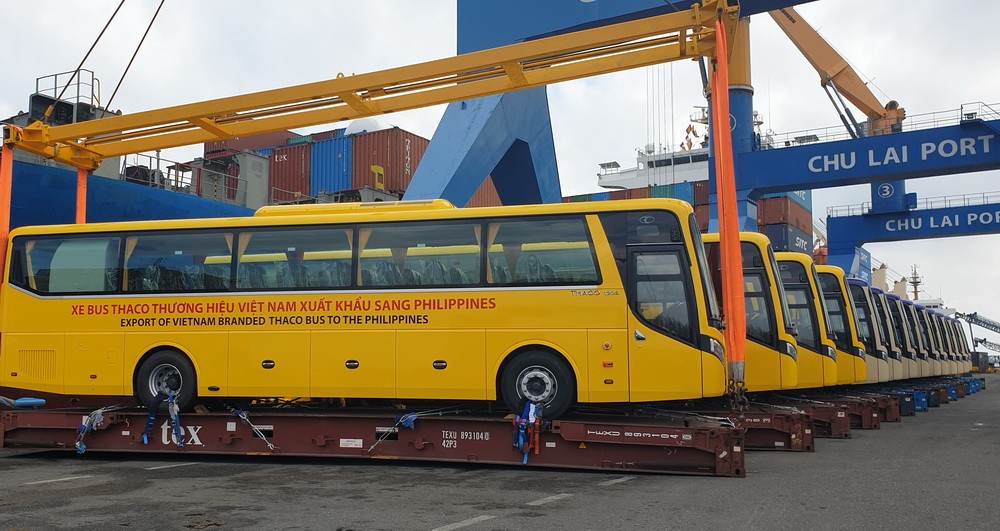 Thaco Forland truck manufactured in Vietnam, demonstrating the development of domestic truck enterprises.
Thaco Forland truck manufactured in Vietnam, demonstrating the development of domestic truck enterprises.
Besides Thaco, the emergence of VinFast in recent years has also brought a fresh breeze to Vietnam’s automotive industry. Although VinFast mainly focuses on cars and electric vehicles, VinFast’s strong investment and vision to reach international markets have created significant momentum for the entire industry. VinFast’s export of VF 8 electric vehicles to the US market is a historic milestone, demonstrating the capability of Vietnamese enterprises to produce cars that meet international standards.
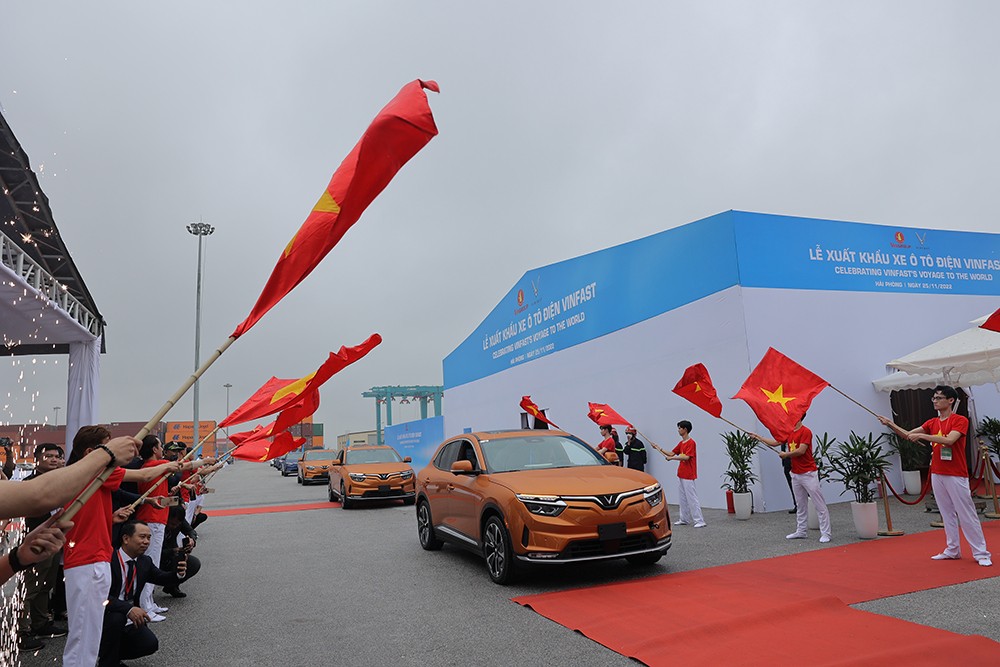 VinFast VF 8 electric vehicle exported to the USA, marking a significant step for Vietnam's automotive industry.
VinFast VF 8 electric vehicle exported to the USA, marking a significant step for Vietnam's automotive industry.
The VinFast factory complex in Hai Phong is built on an area of 335 hectares, with modern scale and technology. The factory is designed with a large capacity, capable of producing many types of vehicles, including electric trucks in the future. VinFast’s investment in advanced technology and production processes has created a new model for Vietnam’s automotive industry.
At the event of exporting the first 999 VinFast VF 8 vehicles to the US, Prime Minister Pham Minh Chinh emphasized the importance of this event, affirming that it is a historic milestone as for the first time, electric vehicles manufactured in Vietnam under a Vietnamese brand officially participate in the global automotive market. The Prime Minister also praised VinFast for quickly adopting the latest, most automated, and most intelligent technologies and gathering many global talents.
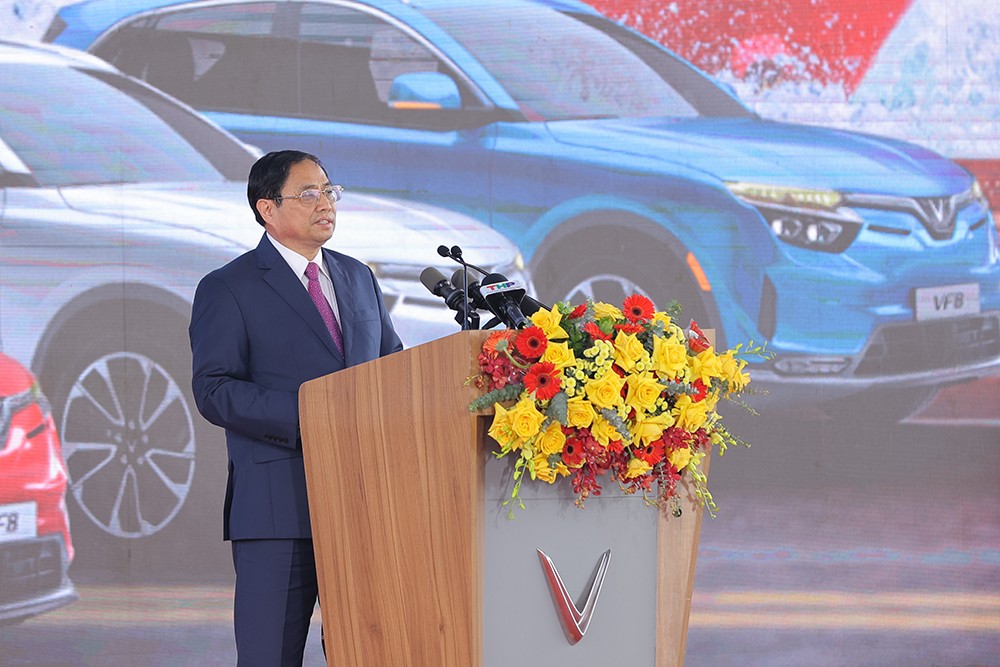 Prime Minister Pham Minh Chinh speaking at the VinFast car export event to the USA, showing government support for Vietnamese automotive manufacturers.
Prime Minister Pham Minh Chinh speaking at the VinFast car export event to the USA, showing government support for Vietnamese automotive manufacturers.
The US Ambassador to Vietnam, Mr. Marc Knapper, also stated that the day VinFast exported electric vehicles to the US was a momentous day for Vietnam, for the US, and for the cooperative relationship between the two countries.
VinFast’s breakthrough is a significant stepping stone, demonstrating that Vietnamese enterprises are pursuing the goal of exporting complete vehicles and gradually realizing the dream of Vietnamese automobile manufacturing reaching global heights. Although Vietnam’s automotive industry is still small compared to the region, with great growth potential and ample room for development, Vietnam is fully capable of developing supporting industries, increasing the localization rate for Vietnamese-branded vehicles, including trucks. In addition, the 0% tariff preference for automobiles within ASEAN remains a major opportunity for Vietnamese truck manufacturers to leverage, promote exports, and affirm their position in the international market.